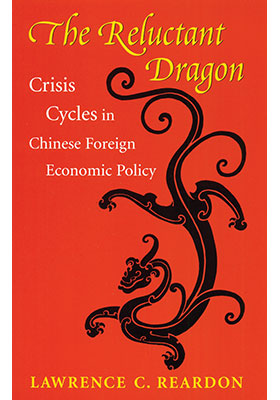The Reluctant Dragon
Crisis Cycles in Chinese Foreign Economic Policy
(中國對外經濟政策的危機循環)
ISBN : 978-962-209-534-2
May 2002
368 pages, 6″ x 9″
For sale in Asia, Australia, and New Zealand only
- HK$250.00
Chinese foreign economic policy before 1978 has been considered isolationist and centered on Maoist self-reliance. In this revisionist analysis, Lawrence Reardon argues that China was not out of touch with the global marketplace during the 1949–78 period and that Deng Xiaoping’s heralded liberalizations in fact were revisions and expansions of policies from the Maoist period.
The dramatic economic reforms initiated by China’s leaders in 1978 boosted GDP by between 9 and 13 percent each year during the 1980s and 1990s, while the nation’s foreign trade figures rose from a trivial US$1.94 billion in 1952 to US$325 billion in 1997. By opening to the outside world and liberalizing the domestic economic infrastructure, China has become the third largest and one of the fastest-growing economies in the world.
The story of China’s on-again, off-again trade efforts provides an important window on the cyclical struggle for power between Mao Zedong’s ideologically driven allies and more pragmatic leaders such as Zhou Enlai and Deng Xiaoping, whose approach eventually prevailed. Reardon relies on primary sources, including Chinese Communist Party histories and other restricted-circulation materials that have recently come to light, to show that China’s apparently sudden turn outward in 1978 was actually an extension of previous experiments hobbled by bureaucratic infighting and conflict among rival elites. He describes in unprecedented detail the seemingly contradictory strategies used by Mao and other leaders to assert China’s absolute self-sufficiency while also striving to modernize the economy and achieve maximum prosperity as rapidly as possible. These latter goals required engagement with global economic forces-even capitalist nations-but were necessary to enhance national security in a hostile geopolitical environment and to assure continued domestic stability.
“Far and away the most comprehensive and detailed account of China’s foreign economic policy making, covering the period from the Chinese Communist Party’s rise to power in 1949 through the early years of the major economic reforms in the late 1970s. The range of primary source materials discovered and used in this study is truly incredible.” —Nicholas R. Lardy, Senior Fellow, The Brookings Institution

